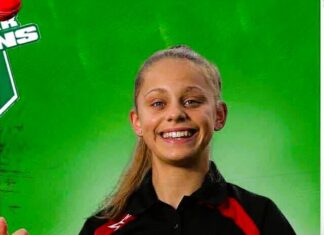Andrew Mathieson
JOHN Trevorrow stands on a bend in the road and feels the whistle of the peloton speed past.
On a sunny day at Portarlington, it’s the second best feeling for him to riding a bike again.
Now approaching 60, time has come and gone for the champion road cyclist.
But the man behind the Bay Classic could not be happier with his lot almost 50 years since he first pedalled to a finish line.
“Sometimes when I’m running an event flat tack, I would not say for one second I enjoy it,” John laughs
“There’s always a wall of things going wrong and you have to fix it.
“But I sat back in the VIP tent for a moment on Sunday and there were thousands of people there and it looked absolutely brilliant.”
The cycling event, which has become an institution around Geelong, celebrated its 20th anniversary this week. The milestone was finally time for John to stop, reflect and listen – for one night at least.
A cocktail party allowed the voice of the sport, Phil Liggett, and cycling heroes like Robbie McEwen, Stuart O’Grady and Baden Cook, to talk about the impact the Bay Classic had on their respective careers.
“Then we showed a lot of vision of the 20 years and, I must admit, it put a lump in my throat,” John says.
For in Geelong, the Trevorrow name is more familiar with buying a bike than the region’s premier cycling event.
Between his sojourns every year, covering the past dozen Tour de Frances for print media, John is still often seen on the shop floor making the good sell to customers.
It was that understanding of what the public wants that got the Bay Classic off the ground, John explains.
“When I started the Bay Classic 20 years ago we had trouble getting crowds to bike races – it’s a bit different now,” he admits.
“Everyone was trying to come up with different ideas, so I thought I’d take the bike race to where the crowds were.
“That’s why I took it to where the holiday resorts were and put something on for holidaymakers to see and it’s worked.”
Cycling was always a part of John’s early life, with his first wins notched up as an 11-year-old in Gippsland.
The victories were also in an era when country towns stopped for visiting tours.
“Cycling was in the blood, too, because my father was a professional cyclist,” John tells.
“There wasn’t much chance of me ever doing anything else.
“I remember we’d be hosting some of the riders and, as a little kid, I’d be listening to all these stories of their tour and the things that would happen out on the road.”
Nothing was bigger than the illustrious Sun tours in John’s heyday.
He won three: in 1975, ‘77 and ‘79.
His Olympics and Common-wealth Games appearances and a bevy of state and national titles almost paled into insignificance compared to the status of the tour wins.
But the biggest thrill was winning his first national road title in 1969. Not just because it was the rookie’s biggest moment but, because on reflection, it was in Geelong.
“I was only 20 and I had never ridden in a national title – I didn’t even know the opposition,” John recalls.
Thousands of rides later, John reckons he’s lucky to count his crashes on one hand.
Still, his cycling career failed to have a storybook end.
“A really bad crash did end my career but it wasn’t on a bike – it was in a car,” he says.
“I basically fell asleep at the wheel and hit a tree.”
That was in 1982 when John was 33. He suffered a fractured skull, a broken nose, a broken collarbone and broken ribs but a “smashed” ankle was the most trouble.
“I actually destroyed the sideways joint and they had to fuse the ankle and take a bone out of my hip,” John regrets.
“It took a long while before I could even walk properly.”
My cycles of life
Digital Edition
Subscribe
Get an all ACCESS PASS to the News and your Digital Edition with an online subscription
Rooke leads Dragons to huge win
Bell Park's Hannah Rooke had an outstanding all-round A Grade game in round 10 of Geelong Cricket Association senior women's competition.
Rooke took the incredible...








